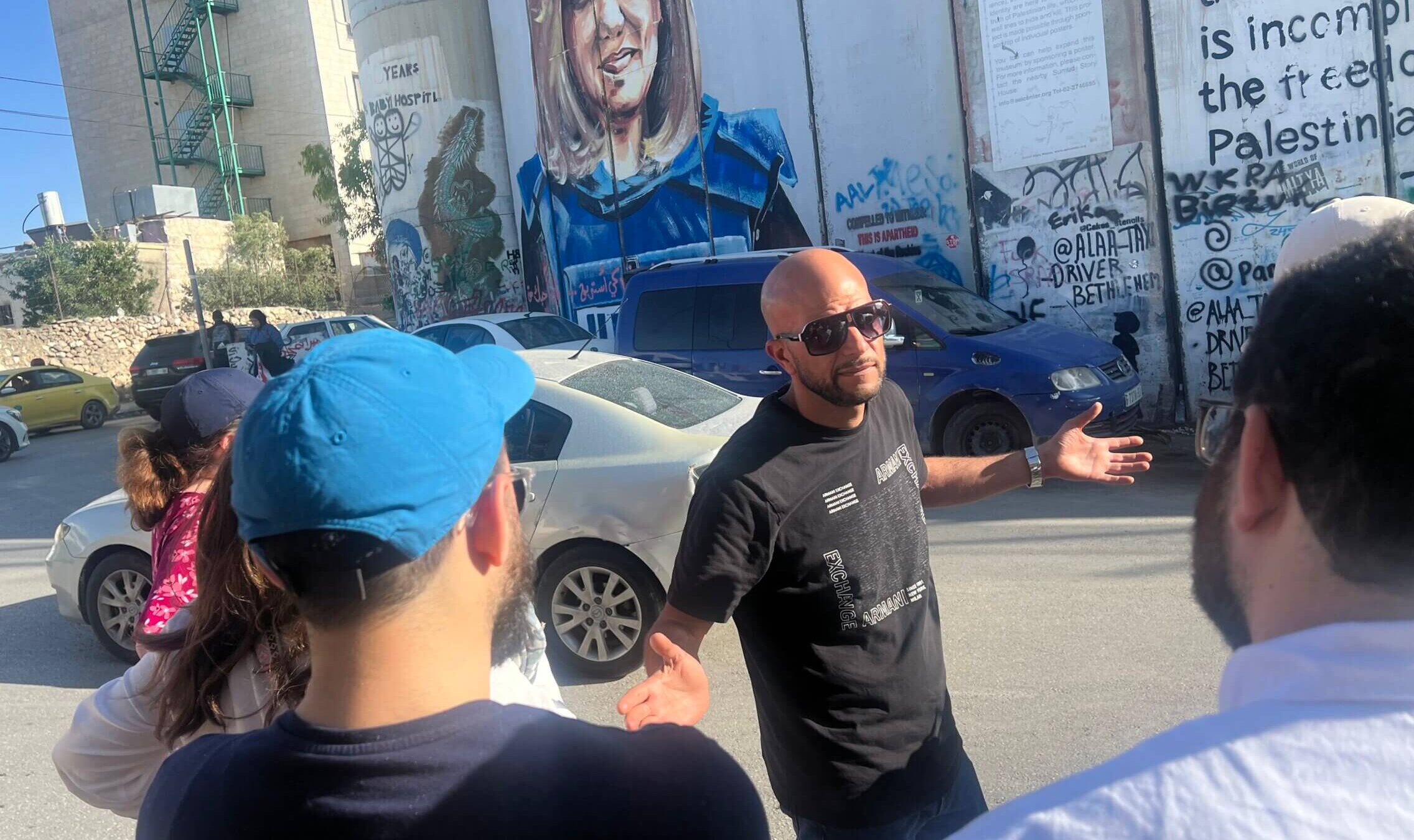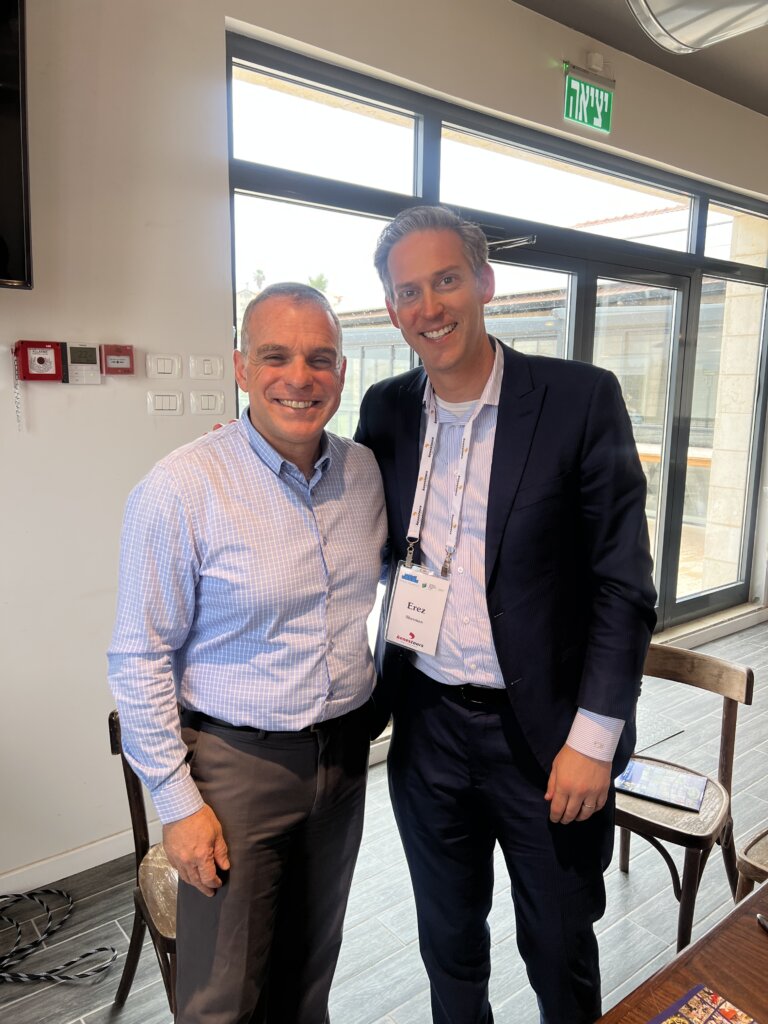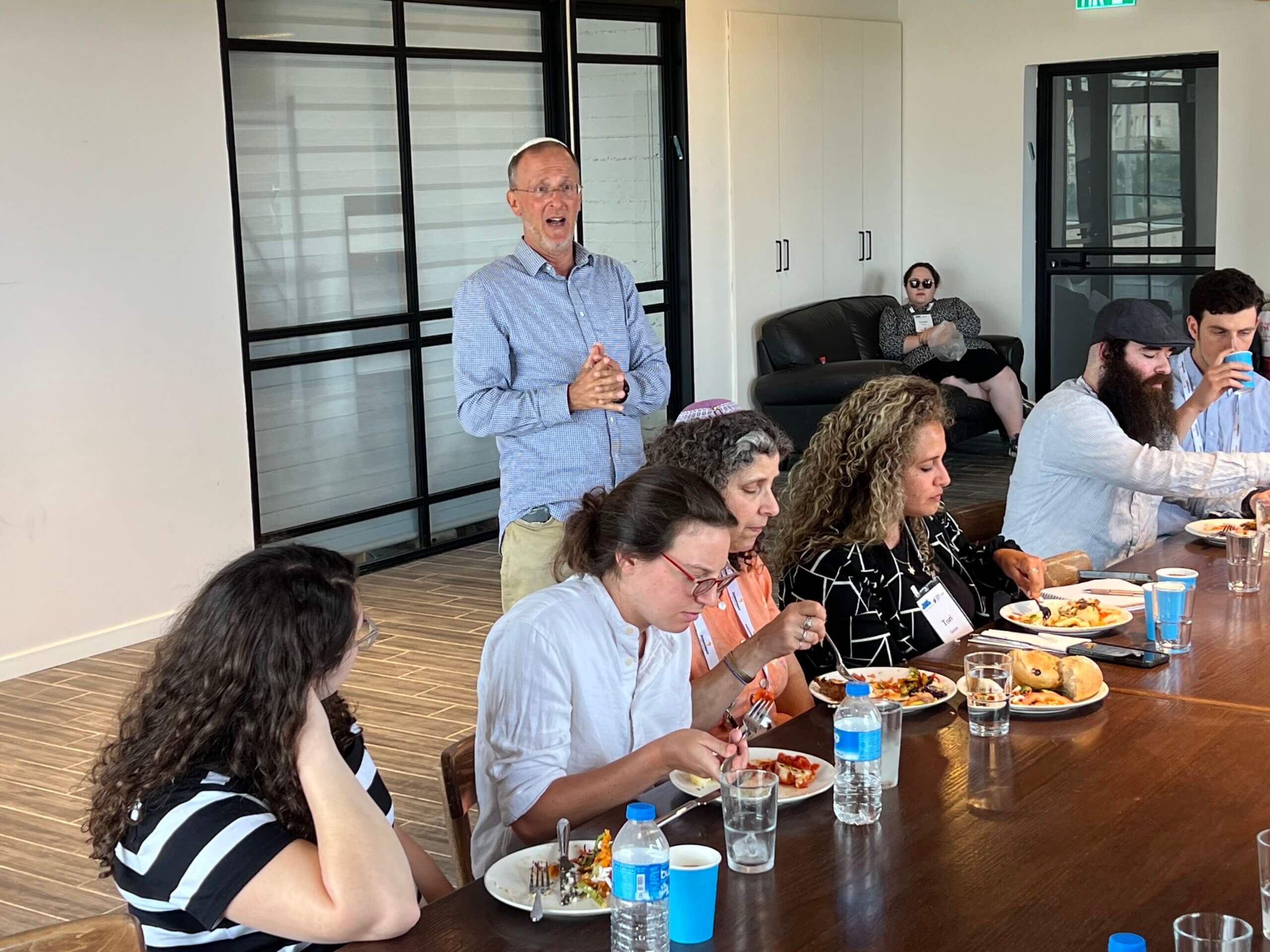Rabbinical students are drifting away from Israel. Here’s how one synagogue is responding
A Los Angeles congregation is worried that future rabbis could be swayed by ‘a celebrity who tweets or posts a TikTok claiming Israel is an apartheid state’

Palestinian journalist and tour guide Rami Nazzal gives American rabbinical students a tour of Bethlehem in the Israeli-occupied West Bank. A new program from Sinai Temple in Los Angeles is intended to help future rabbis learn how to have difficult conversations about Israel and Zionism. Photo by Erez Sherman
When a major round of fighting between Israel and Hamas broke out two years ago, many Jewish leaders were alarmed to see dozens of American rabbinical students sign an open letter lamenting Israel’s “violent suppression of human rights” and “apartheid.”
Some took a combative approach. The Zionist Rabbinical Coalition called on rabbinical seminaries to make support for Israel an admissions requirement, while the dean of a Conservative seminary scolded his students who signed the letter for going “beyond the normal circle of diverse opinion.”
Those responses weren’t enough for some Jewish philanthropists, who worried that the apparent cracks in bedrock support for Israel that has long been taken for granted among rabbis required a more engaged response.
Now a prominent Los Angeles synagogue has answered that call, announcing this week a new fellowship for rabbinical students meant to teach them about Israel and Zionism, and provide a more controlled environment for them to hash out concerns about the Jewish state.

“As they go into the field, they can have a group — a think tank — to do this with before anything comes out in a tweet, Tiktok, Instagram and letter,” said Rabbi Erez Sherman, who is running the new program for Sinai Temple said in an interview.
While Sinai Temple is the largest Conservative synagogue in the city, the fellowship is intended to draw rabbis from different denominations.
Sherman said in a statement announcing the new fellowship that young rabbinical students were at risk of being swayed by “a celebrity who tweets or posts a TikTok claiming Israel is an apartheid state.”
To address this, Sinai Temple brought an initial cohort of 15 rabbinical students to Israel Monday for a weeklong trip where they are meeting with Israelis, including settler leaders, and some Palestinians, as part of a yearlong pilot program.
First fellowship sponsored by a synagogue
There are already a number of Israel fellowships for rabbinical students spanning the ideological spectrum. For example, T’ruah, the liberal rabbis group, runs a program where American students studying in Israel can learn about Palestinian human rights issues, while AIPAC organizes a fellowship to teach future pulpit rabbis how to become pro-Israel advocates.
But Sherman said that the Sinai Temple program is the first fellowship organized by a synagogue, and he believes that provides a unique advantage at a time when some rabbis are shying away from talking about Israel with congregants and even colleagues.
“The premise of this program is that rabbis can’t talk about Israel — so let’s model that rabbis can talk about Israel,” he said.
Sherman emphasized that the fellowship had no political agenda beyond embracing Ahavat Yisrael, or love for the Jewish people, and noted that Sinai Temple has hosted both Mort Klein, the far-right leader of the Zionist Organization of America, and Jeremy Ben-Ami, the founder of J Street, which supports a two-state solution to the Israel-Palestinian conflict.
The program is paid for by a staunchly Zionist foundation and two conservative philanthropists. In addition to Sinai Temple’s Israel Center, the initial funding comes from the Jewish National Fund and the foundations of Paul Singer, the billionaire investor and Republican political megadonor, and Michael and Lisa Leffell, who endowed AIPAC’s rabbinic student fellowship and also contribute large sums to Republican politicians.

Israel discussions ‘very fraught’ for rabbis
Tori Greene, who just finished her second year at Hebrew Union College-Jewish Institute of Religion, the Reform seminary, said she has had experience facilitating difficult conversations about Israel as a Birthright tour leader. But the Sinai Temple program has been helpful because it allows her to participate, rather than be the person in charge.
“When I’m teaching, or I’m facilitating, I’m not asking questions, I’m opening space for my participants to ask questions,” said Greene, who also runs an educational Instagram account about Jewish issues. “It’s nice to be the one to ask the questions.”
Like Greene, Matthew Schultz, a third-year student at the independent Hebrew College seminary, had spent a significant amount of time in Israel before participating in the Sinai Temple fellowship and has written about the country as a columnist for the Jewish Journal.
Still, he said that a meeting with an evangelical Christian Zionist leader in Israel Tuesday was a new experience for him.
Schultz said most rabbinical students understand that talking about Israel with their congregations, or with others in the Jewish community, will be “very fraught.”
“You’re swimming between your own sense of what you want to say, the sensitivities to what the community feels, the inevitability that you’re probably going to alienate multiple people,” Schultz said. “It’s definitely a huge issue that communities I’m a part of are grappling with.”
A message from our Publisher & CEO Rachel Fishman Feddersen

I hope you appreciated this article. Before you go, I’d like to ask you to please support the Forward’s award-winning, nonprofit journalism during this critical time.
We’ve set a goal to raise $260,000 by December 31. That’s an ambitious goal, but one that will give us the resources we need to invest in the high quality news, opinion, analysis and cultural coverage that isn’t available anywhere else.
If you feel inspired to make an impact, now is the time to give something back. Join us as a member at your most generous level.
— Rachel Fishman Feddersen, Publisher and CEO






















